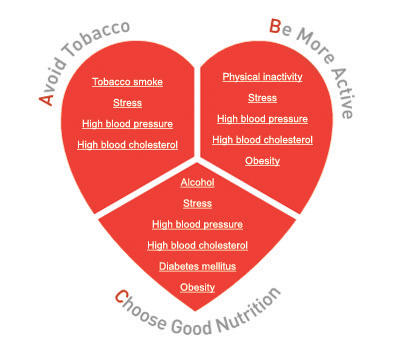Risk Management of the Heart
From: http://www.superfoodfitness.com/articles/healthy-food-for-the-heart-making-the-right-choices/
Heart disease is the number one killer in the United States. However, healthy lifestyle modifications may reduce many risk factors
What is heart disease?
Heart disease, also known as cardiovascular disease or coronary heart disease, is a broad term for conditions that result in narrowed or blocked blood vessels that may lead to chest pain, heart attack, or stroke. Common cardiovascular diseases include atherosclerosis (hardening of the arteries), hypertension (high blood pressure), and heart failure, all of which are related and often coexist. Other conditions such as arrhythmia (irregular heart beat), heart valve problems, or congenital heart defects, also fall under the definition of heart disease. Despite being a mostly preventable disease, death as a result of cardiovascular disease is the number one killer in the United States.
Most often, heart disease occurs due to poor lifestyle choices including lack of physical activity, tobacco use, or an unhealthy diet. Risk factors such as age, gender, and family history also play a major role. Heart disease may also occur as a result of infections or genetic abnormalities affecting the heart, not related to lifestyle choices.
(Bellows & Moore, 2014)
Risk Mangement through Diet:
-
Consume a diet rich in vegetables, fruits, and whole-grains.
-
Limit the amount of saturated fat, trans fat, and cholesterol in the diet.
-
Read the ‘Nutrition Facts’ on food labels.
-
Choose lean meats and plant-based protein sources.
-
Cook meals that are low in saturated fat, trans fat, and cholesterol.
-
-
Limit foods and beverages with added sugar.
-
Choose foods with low salt content.
(Bellows & Moore, 2014)
Risk Management through Exercise:
According to the American Heart Association, exercising 30 minutes a day five days a week will improve your heart health and help reduce your risk of heart disease. They define "physical activity" as anything that makes you move your body and burn calories. This includes: climbing stairs, playing sports, walking, jogging, swimming, biking, and more.
No matter what you do, all studies indicate that some exercise is better than none. According to a review published in Circulation, people who engaged in 150 minutes of moderate-intensity leisure activity per week had a 14 percent lower risk of coronary heart disease than those who reported no exercise. The more you exercise, the lower your risk. The Mayo Clinic suggests that you can even benefit from 10-minute intervals several times a day.
(Story & Krucik, 2012)
Risk Management through Quiting Smoking:
Smoking decreases your tolerance for physical activity and increases the tendency for blood to clot. It decreases HDL (good) cholesterol. Smoking creates a higher risk for peripheral artery disease and aortic aneurysm. It increases the risk of recurrent coronary heart disease after bypass surgery. So why not quit?
(Why Quit Smoking, 2014)
Risk Management through Stress Control:
It’s important to learn how to recognize how stress affects you, learn how to deal with it, and develop healthy habits to ease your stress. Stress is your body’s response to change. The body reacts to it by releasing adrenaline (a hormone) that causes your breathing and heart rate to speed up, and your blood pressure to rise. Constant or continuous stress can be harmful to your heart health. The good news is you can actively manage your stress before it becomes a problem. Eat healthy, exercise, take breaks, and seek psychological help if needed to keep stress levels to a minimum.
(Bass, n.d.)
("Stress and Heart Health, 2014)
Risk Management through CPR Training:
About 92 percent of sudden cardiac arrest victims die before reaching the hospital, but statistics prove that if more people knew CPR, more lives could be saved. Immediate CPR can double, or even triple, a victim’s chance of survival. Encourage friends and family to take a class and get certified, especially if they work with populations that are more likely to have a cardiac emergency.
("What is CPR", n.d.)

